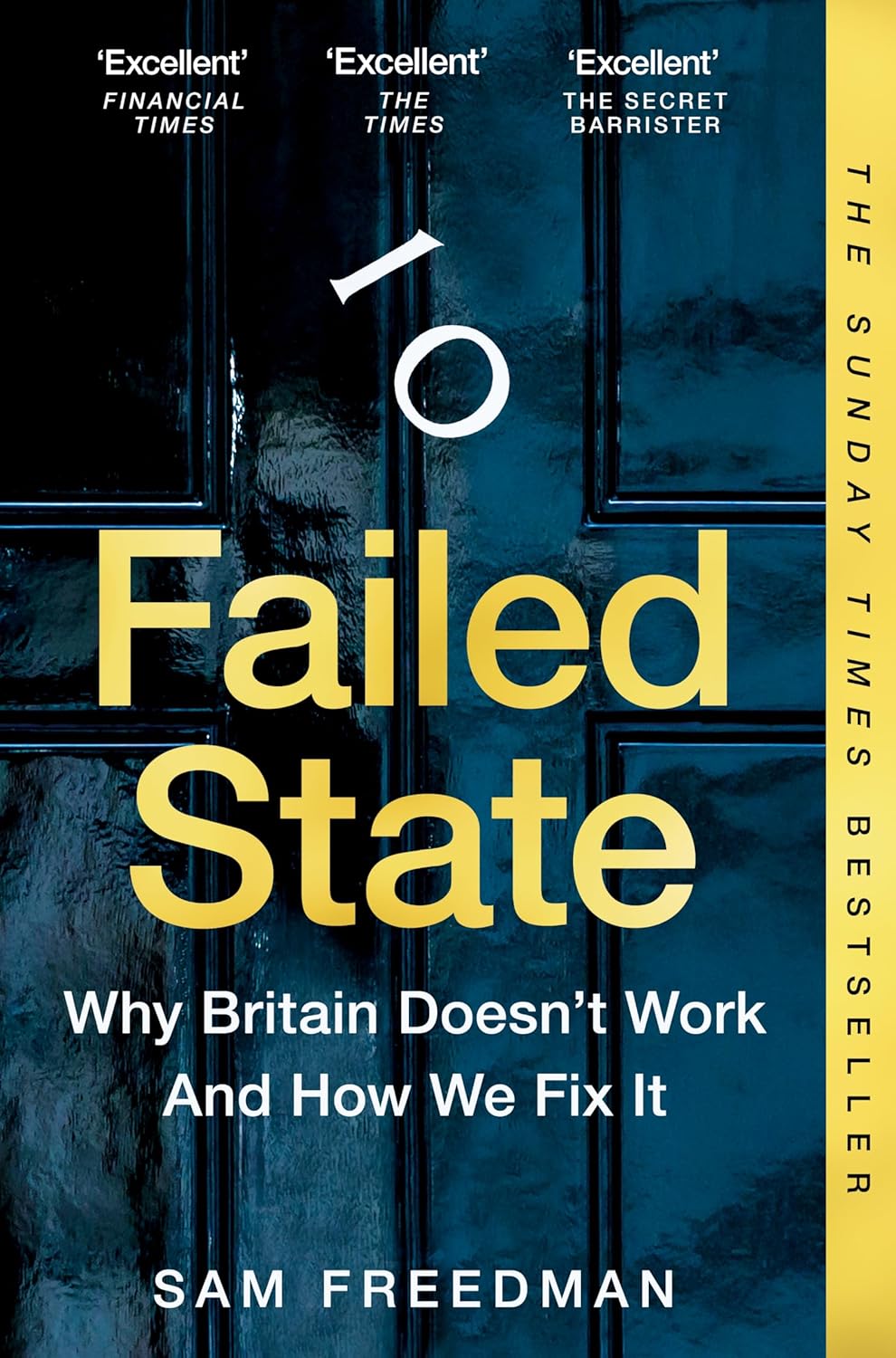Failed State: The Sunday Times Bestselling Investigation Into Why Britain is Struggling
£9.00£10.40 (-13%)
The Top Five Sunday Times Bestseller
‘Excellent . . . persuasive . . . convincing’ – The Times
‘Funny, whipsmart and devastating. Sanity on steroids’ – Emily Maitlis
‘Fantastic. An exquisite analysis’ – The Secret Barrister
Why does nothing work in Britain?
It’s harder than ever to get a GP appointment. Burglaries go unpunished. Rivers are overrun with sewage. Real wages have been stagnant for years, even as the cost of housing rises inexorably. Why is everything going wrong at the same time?
It’s easy to blame dysfunctional politicians who are out for themselves. But, in reality, it’s more complicated. Politicians can make things better or worse, but all work within our state institutions. And ours are utterly broken.
In Failed State, Sam Freedman, one of Britain’s leading policy experts, offers a devastating analysis of where we’ve gone wrong. With historical depth and plenty of infuriating examples, he explains why British governance has fallen so far behind. Speaking to politicians of all stripes, civil servants and workers on the frontline, this book bursts with insight on the real problems that are so often hidden from the front pages. The result is a witty, landmark book that paves the way for a fairer and more prosperous Britain.
‘We can only hope that every member of the new government will read and digest this book’ – David Aaronovitch, BBC Radio 4 Presenter
‘Brilliantly timed and frighteningly true’ – Sir Anthony Seldon, bestselling author of Johnson at 10
Read more
Additional information
| Publisher | Main Market edition (3 April 2025), Pan |
|---|---|
| Language | English |
| Paperback | 384 pages |
| ISBN-10 | 1035026600 |
| ISBN-13 | 978-1035026609 |
| Reading age | 18 years and up |
| Dimensions | 13.1 x 2.4 x 19.9 cm |







by Peter James
A good analysis of the problems in our study. However the author, with obvious left wing credentials, places too much confidence in the ability and probity of public sector managers. For example, the HS2 farce owes as much to the incompetence of transport ministry officials as stupid decisions by ministers (Adonis, Cameron and Johnson; I’m looking at you). The author has several quotes about the civil service being generalists and having not placed any emphasis on having in house specialist capability (far too much reliance is placed upon consultants who have their own agendas and aren’t really that good).
by Mike
It’s an interesting book based on interviews and comment from credible sources. My only frustration is that it lacks broader statistical context, such as how effective local councils are etc. such points are covered through comment but would benefit from hard data as very few experts in such areas are truest neutral in their motives. It’s still an interesting read.
by Andy Noble
A great book and a warning for us all. If we continue on our way we are heading for a huge divisive crisis. This brilliant book lays out what are the problems are with how Britain’s government doesn’t work and what can be done to change it. Real question is so we have the politicians with the ability and courage to do the right thing.
by M W AUSTIN
An interesting read which explains to a large extent why governing this country is so difficult. What was frustrating was it ended without giving any meaningful suggestions about how the problems could be fixed.
by JWH
This is a very useful insider survey of what has gone wrong with governance in the UK. The analysis is generally acute, well-informed (the author is somewhat of an insider himself) and very well written. It is perhaps especially useful at making clear the incentives that help explain the behaviour of certain political actors and systems that might not be so obvious from the outside. In particular, the changes in the emphasis on communication over policy which gathered pace in the 1980s, were turbo-charged in the mid-1990s and then came to dominate from the 2000s onwards are explained fairly, without too much unhelpful quixotic or moralistic commentary. The author’s ability to explain from both the political and the media’s point-of-view is useful.
More emphasis is given in the book to explanation than suggesting solutions, although these latter aren’t ignored. Tactically the solutions generally seem to this reader workable and sensible. I suppose that the weakest section for me was the lack of real explanation of why, given the history and the incentives, he should suppose that without reworking the incentive structure in a meaningful way, then anything could possibly change by effectively, political willpower in the face of those incentives. ‘Better policy’ would have to be rewarded and ‘eye-catching initiatives’ would have to be punished, as would politicians (and their activist and journalist outriders) who used the media to attack other politicians, especially on the grounds of ‘not taking responsibility’ (because otherwise the objects of the attack would have an incentive to fight the media war just to neutralize the attacks). None of this is really tackled, so one has some sympthathy with Cummings’ alternate strategy (reinforce the centre of politics even more) in which the incentives at least line up better.
by Amazon Customer
This is easily the best book I have read on the state of our polity. Clearly and accessibly written, full of telling – and shocking – evidence, rational, well thought-out remedies. It should be read widely.
by Amazon Customer
This excellent book is the best I have read in describing the state of the U.K. government at this time (November 2024), the author, Sam Freedman, has a sense of humour but pulls no punches in his opinions regarding the political situation in Great Britain. Basically, he suggests that government policy is now much too centrally-based, with much of the decision making over the past 50 years having been gradually taken away from local government; so that now, Downing Street and The Treasury have much more work than they can reasonably deal with. And, this problem is compounded by the negative influence of today’s media, which demands instant, short-term, snap decisions from the government; resulting in often rushed and botched policies and wasted resources. This is Sam Freedman’s first book, and it’s the best assessment of the current political scene (more or less ‘organised chaos’) that I’ve read so far. One can only hope that it won’t be the last book we get from Mr. Freedman, as it’s certainly one I would heartily recommend to anyone looking for a clear-sighted and informative view of the state of the political crisis facing Britain today.
by Kathy
An in-depth study of how and why our state systems are no longer fit for purpose with suggested remedial action. However, I can see little hope of change unless we can find politicians who care more for the future of our country, than for their own aggrandizement .
by Hermine
Viele Interessante Ansätze aus Grossbritannien… was schief läuft und so weiter. Sollten auch deutsche Politiker lesen